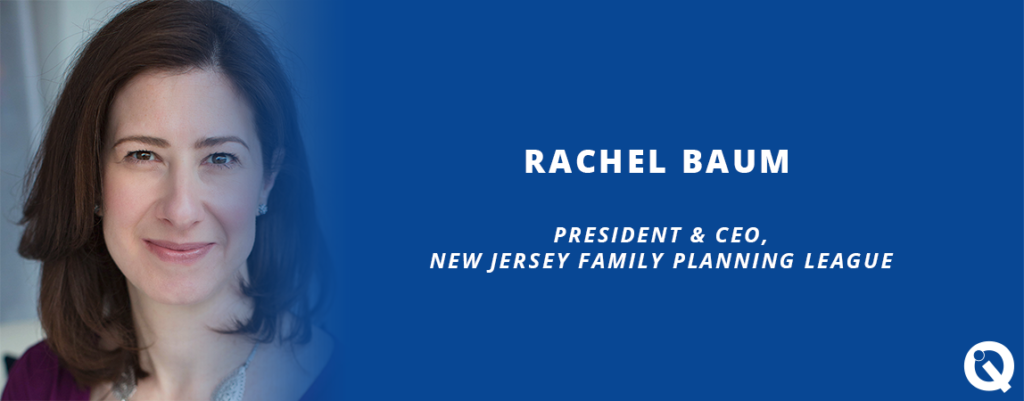Rachel Baum is President and CEO of the New Jersey Family Planning League, a member of the Quality Institute’s Association Council.
As the new CEO of the New Jersey Family Planning League, can you tell us about the organization?
The New Jersey Family Planning League has been around for over 45 years. We work to ensure access to high quality and comprehensive family planning health care services for anyone in New Jersey, regardless of age, identity, immigration status or ability to pay. We want everyone to have access to high quality services and a full range of contraceptive options, or to support their health as they plan for a pregnancy.
We receive federal and state funds, and then it’s our job to understand the landscape of need across the 21 counties of New Jersey. We disseminate, manage, and oversee the use of these funds — with the priority of serving people who are low income, uninsured, and those who might not otherwise have access to reproductive health care. We fund 13 provider organizations with a total of 57 health care service sites in all 21 counties. Our diverse network of providers utilizes current evidence-informed standards of care and best practices — the gold standard of family planning health care service delivery.
What are your priorities for the future?
Our priority is to ensure that folks are aware of the breadth and availability of services. The work that we support is helping people to decide the number and spacing of their pregnancies — or if they will ever have a pregnancy. We work to support access to the full range of contraceptives and make sure these services are available without barrier to every person to make their decision about which contraceptive method they may want. Or we help them to be as healthy as possible if they’re looking to have a pregnancy. We also support sexually transmitted infection testing and treatment, HIV testing, PrEP, and breast and cervical cancer screenings.
We will continue to assess for areas of need throughout the state, to ensure that contraceptives are available and accessible. It’s also critical for folks to be aware of where services are available. They may be in more places than you think. Some, such as Planned Parenthood, are more well-known. We also support several federally qualified health centers, hospital-based health centers, and standalone community-based family planning health care providers. We have a county health department and an academic-based health center in our network. Some of these providers offer family planning integrated into primary care and alongside other health care services. We are focused on increasing the capacity of providers and raising awareness of available family planning services and connecting people to providers.
What do you see as the biggest opportunities to advance sexual and reproductive health care services?
First, I will say in New Jersey we have a wealth of support for reproductive health that comes from the governor and legislature. The First Lady’s initiative to address black maternal and infant health is a tremendous initiative. She (Tammy Murphy) brought to light an unflattering but critically important issue: our state’s devastating racial disparities in maternal and infant health. … The Nurture NJ work focuses on the need to view health more holistically and understand how structural and systemic inequities, in addition to social determinants of health, impact individuals and families, sometimes for generations. Looking at the broader picture, if a person’s basic needs aren’t being met, if they don’t have what they need to care for and keep their family safe, how does that affect their decisions around reproductive health?
How has the pandemic affected access to care at the health centers you support?
Our providers showed tremendous passion and drive and creativity to make sure that individuals got the services they needed. People were still having sex. They still had STDs. Our providers set up opportunities for people to drive through and get contraceptives, or get specimen collection kits for STDs, to get treatment for STDs. In rural areas we made sure people got their Depo Provera (contraceptive injections). We taught people how to self-administer their shots. And we offered telehealth. A crisis reveals what we can do if we are creative. And I think that a lot of these adaptations will become part of the norm for care moving forward. I hope they will because they provide more access to more people.
We like to ask a question beyond a person’s professional life. Where might we expect to find you on a sunny day outside of work?
I love to walk. I’ll go for miles to explore. I spent a good deal of my life in New York City and love to explore neighborhoods. Here in and around my town of Maplewood I love to discover new areas.

